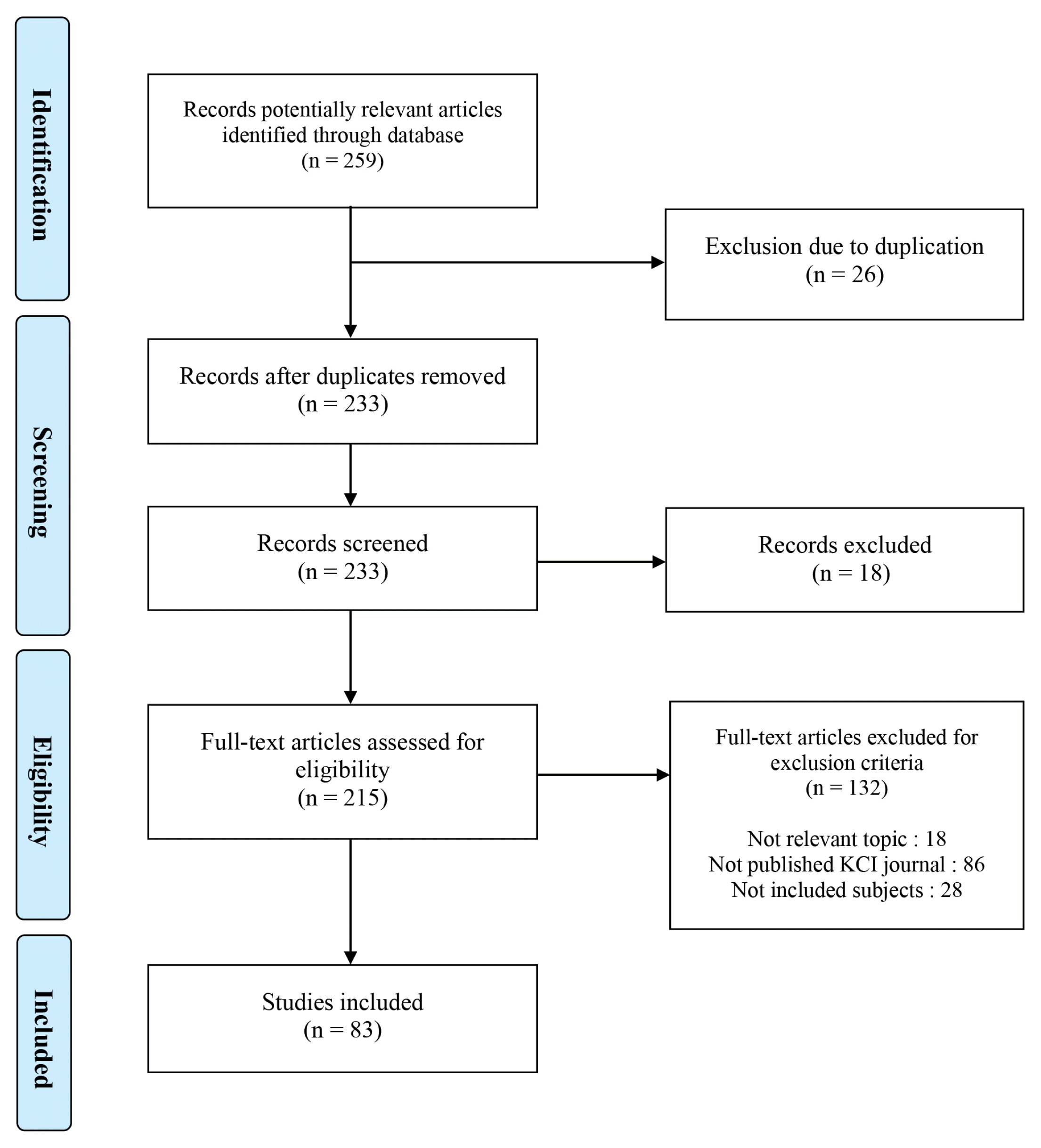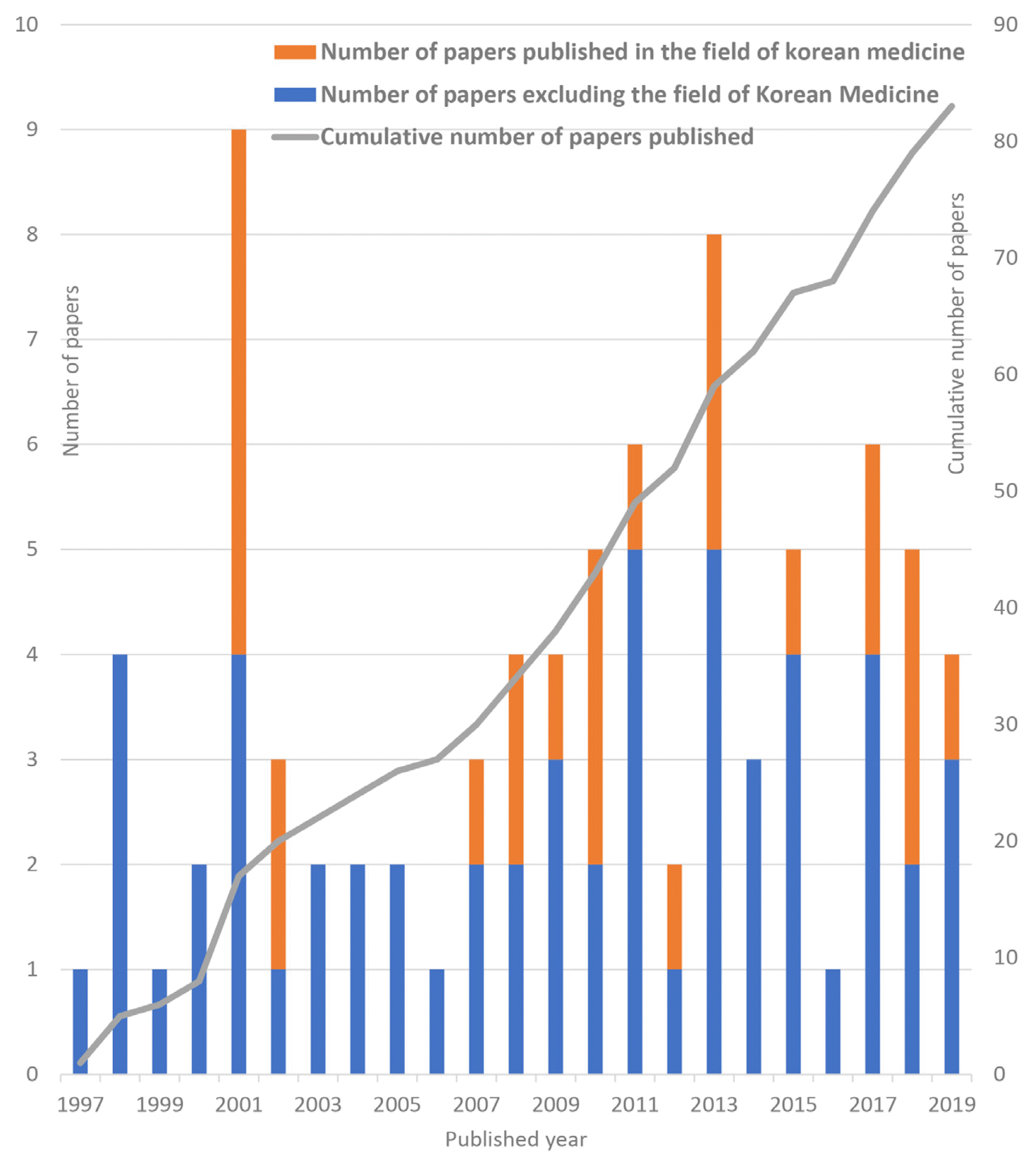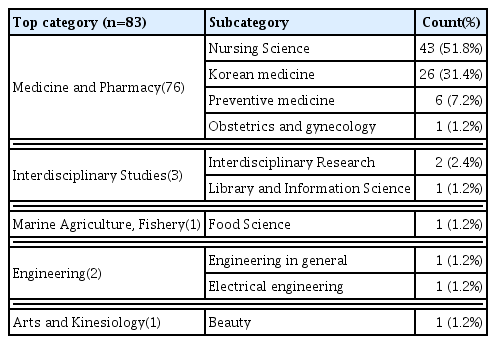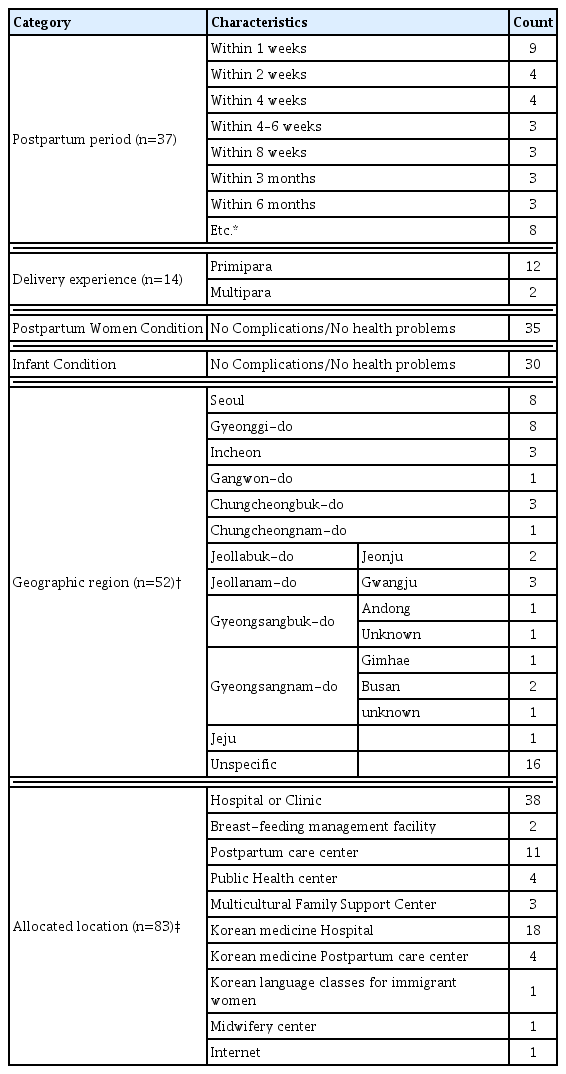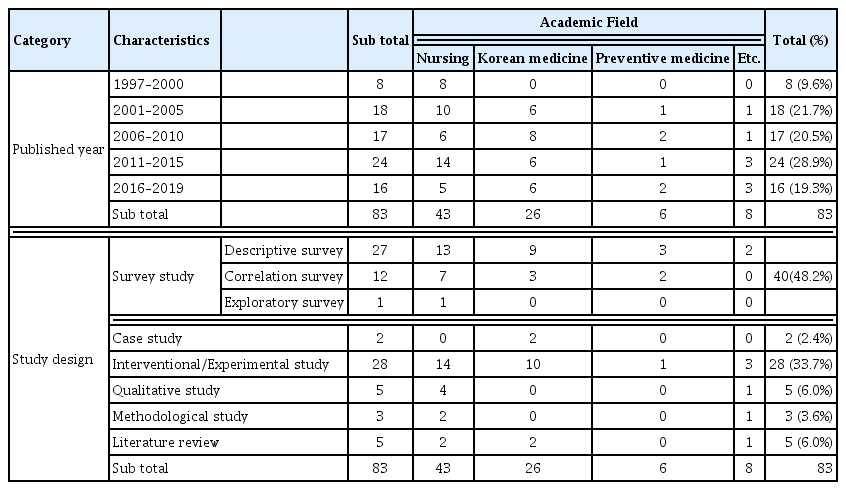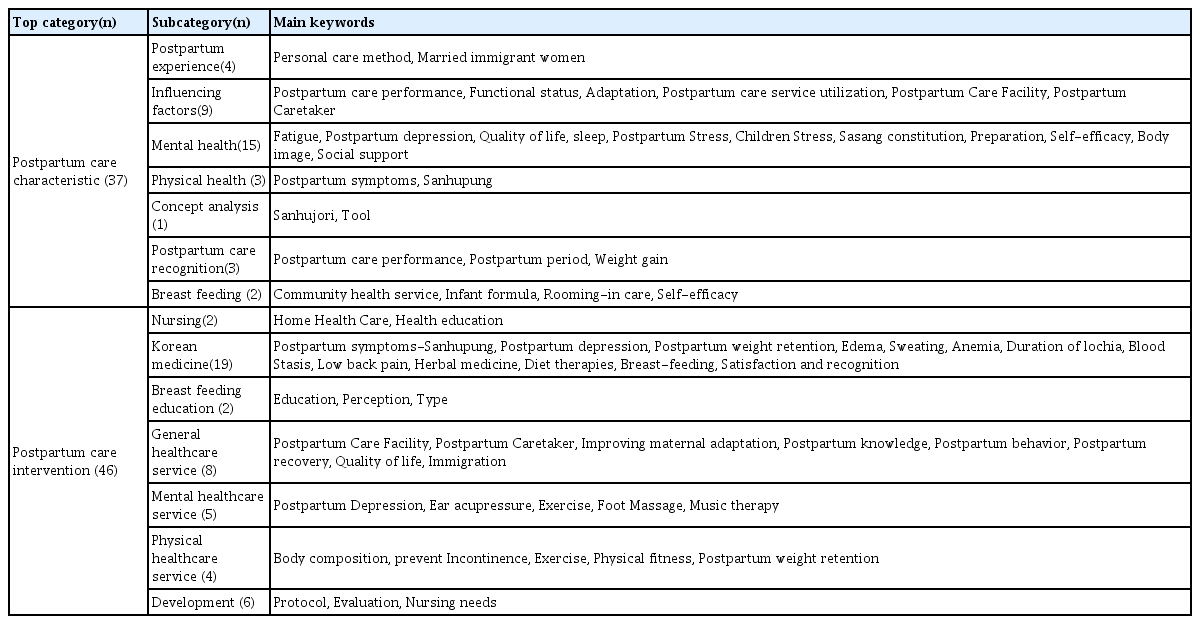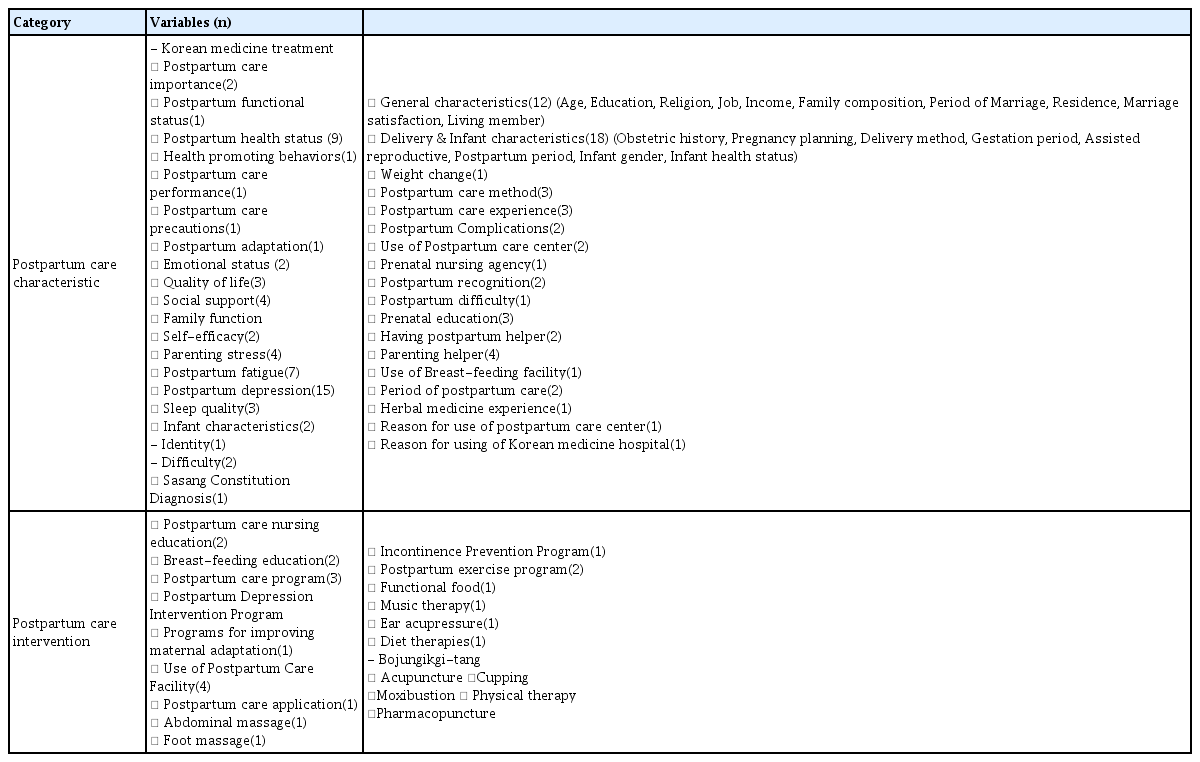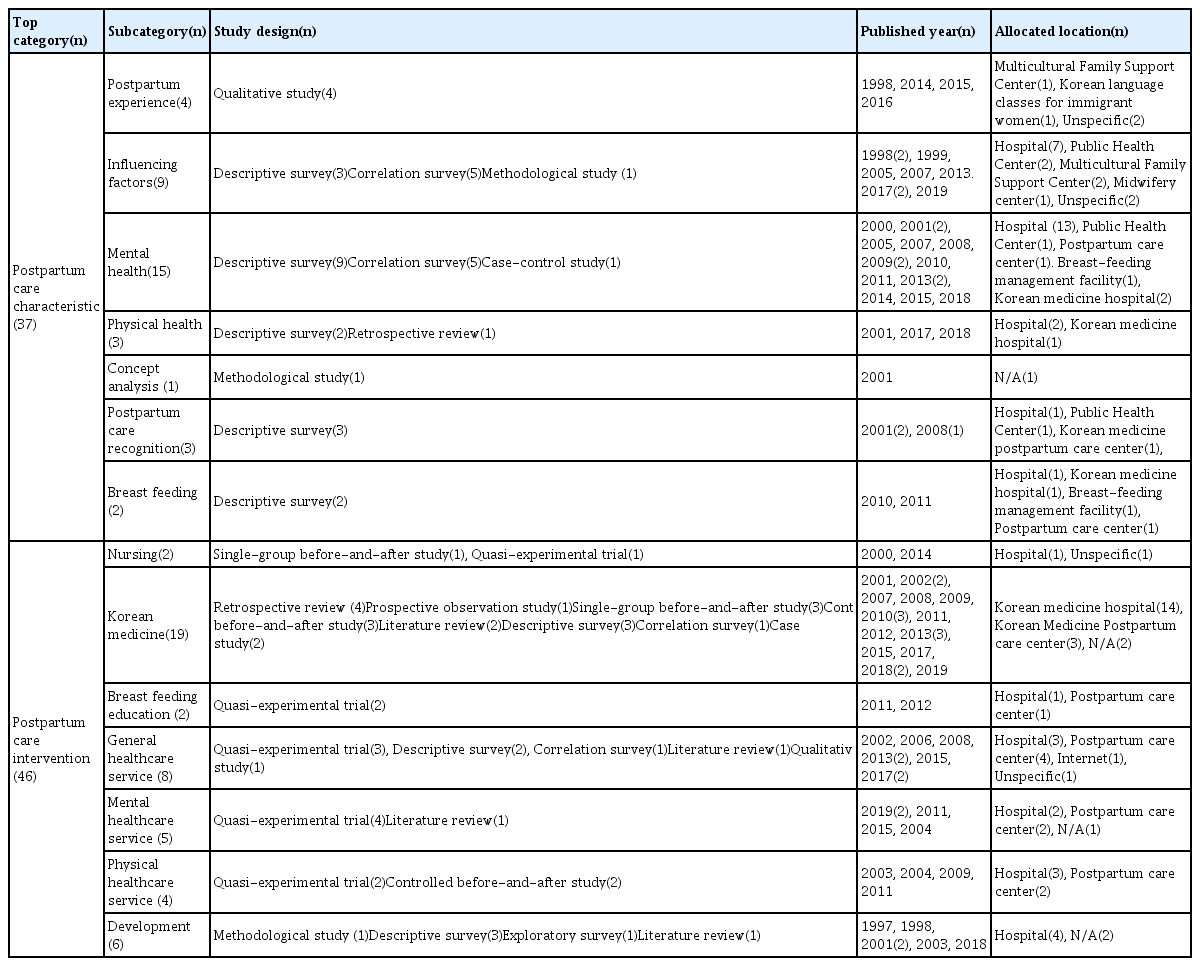Analysis of Research Trends on Postpartum-women Healthcare: A Scoping Review
Article information
Abstract
Objectives
The purpose of this scoping review is to describe the research trends of postpartum healthcare for postpartum women, as well as to identify further direction for research in the area of postpartum healthcare.
Methods
This study was conducted sequentially according to the Scoping Review Method referred to as ‘frameworks of Arskey and O’Malley’. We searched for articles published as of May 15th, 2020 in seven Korean databases in order to obtain the data. A key term search strategy was employed, including terms such as “Postpartum period care”, “Postpartum health”, “Postpartum care”, and “Postpartum status” to identify relevant studies.
Results
Eighty-three articles were selected from a total of 259. The research has been undertaken steadily since 1997, particularly in the fields of Nursing and Korean medicine. In terms of study design, survey studies were the majority (48.2%), followed by interventions and experimental papers (32.5%). However, qualitative research areas are lacking. The research topics were largely divided into two categories: postpartum care characteristics and postpartum care interventions. The characteristics of postpartum care were highly connected with care for mental health. Among the postpartum care interventions, the most common employed was Korean medicine intervention.
Conclusion
This study confirms that management of mental health during the postpartum period is necessary. In addition, it is necessary to identify the experiences of postpartum women and the effectiveness of a postpartum care intervention program through the utilization of qualitative research methods. In particular, such research is needed in the field of Korean medicine.
Notes
이 논문은 2020년도 국립중앙의료원 공공보건의료연구소의 지원을 받아 수행된 연구사업임 (과제번호; NMC2020-PR-02)
References
Appendices
Appendix 1 List of included papers
References
1. Shin HS, Lee KH. The Lived Experiences of Postpatal Women in Che-Ju island. Korean J Women Health Nurs 1998;4(2):271–85. 2. Lim HS. The Experience of Transition in Pregnancy and Childbirth among the Married Immigrant Women in Korea. Korean J Women Health Nurs 2011;17(3):243–55. 3. Kim SH. Health Care Experiences of Vietnamese Marriage Immigrant Women during Pregnancy, Childbirth, and Postpartum Period in Korea. Journal of Korean Public Health Nursing 2015;29(2):325–43. 4. Song JE, Park SM, Roh EH. The Postnatal Care Experiences among First Time Chinese Immigrant Mothers Living in Korea. Korean J Women Health Nurs 2016;22(1):48–60. 5. Kim TK, Yoo EK. A Correlational Study on the level of Importance & performance of postpartal Care and its Relationship with Women’s Health Status. Korean J Women Health Nurs 1998;4(2):145–61. 6. Jo L, Choi SH. A Study on Factors Influencing the Health Promoting Behaviors in Postpartal Women. Journal of Korean Academy of Fundamentals of Nursing 1998;5(2):353–61. 7. Yoo EK. A Study on functional Status after Childbirth under the Sanhujori. Korean J Women Health Nurs 1999;5(3):410–419. 8. Ahn SH. Canonical Correlation between Korean Traditional Postpartum Care Performance and Postpartum Health Status. J Korean Acad Nurs 2005;35(1):37–46. 9. Kim JI. Related factors to postpartum care performance in postpartum women. Korean J Women Health Nurs 2007;13(2):98–104. 10. Kim KW, Jeong GH. Development of a Scale to Assess Immigrant Women’s Needs for Pregnancy and Postpartum Adaptation. Korean J Women Health Nurs 2014;19(4):242–53. 11. Jung YS, Kwon YD. Factors Affecting the Use of Postpartum Care Services. The Korean Journal of Health Service Management 2017;11(1):143–58. 12. Sakong J, Park DH. An Analysis on the Determinants and Equity of the Postpartum Care Service Utilization. Health Policy and Management 2017;27(4):304–14. 13. Jeong GH, Kim KW, Baik SH. Comparison of Needs for Pregnancy and Postpartum Adaptation of Chinese Immigrant Women and Vietnamese Immigrant Women in South Korea. Korean J Women Health Nurs 2019;25(1):19–30. 14. Choi ES, Oh JA. A Study on the Factors related to Postpartum Depression in Postpartum Women. Korean J Women Health Nurs 2000;6(3):358–71. 15. Kim SJ, Jeong GH, Kim EH. Mothers Perception of Fatigue in Postpartum Period. Korean J Women Health Nurs 2001;7(4):461–72. 16. Kim LH, Kwon BY, Kim SY. A Clinical Study on the Social Environmental Factors of Postpartum blues and depression. J of Oriental Neuropsychiatry 2001;12(2):27–35. 17. Kim JW, Kim JH, Kim BJ, Eun DS, Kim H, Kim JE, et al. Psychosocial and Obstetric Factors associated with Postpartum Depressive Symptoms. Korean journal of obstetrics and gynecology 2004;47(10):1865–71. 18. Jung MH, Kim JI. A Study on the Relationship among Prenatal Emotional Status, Preparation for Delivery, Postpartum Social Support and Postpartum Blues. Korean J Women Health Nurs 2005;11(1):38–45. 19. Song JE. Predictors of Postpartum Fatigue Between Early and Late Postpartum Period in Parturient Women - Divided by 3/4 Weeks of Postpartum Period -. Korean J Women Health Nurs 2007;13(4):299–309. 20. Cho EJ. Subjective Sleep Quality in Depressed and Non-Depressed Mothers During the Late Postpartum Period. Korean J Women Health Nurs 2009;15(2):108–20. 21. Song JE. Factors Related to the Childcare Stress among Primiparous Women who delivered at Women’s Health Hospitals. J Korean Soc Matern Child Health 2009;13(2):158–70. 22. Lee SO, Yeo JH, Ahn SH, Lee HS, Yang HJ, Han MJ. Postpartum depressive score and related factors pre-and post-delivery. Korean J Women Health Nurs 2010;16(1):29–36. 23. Choi SY, Gu HJ, Ryu EJ. Effects of Fatigue and Postpartum Depression on Maternal Perceived Quality of Life (MAPP-QOL) in Early Postpartum Mothers. Korean J Women Health Nurs 2011;17(2):118–25. 24. Yeo JH, Chun NM. Influence of Childbirth Experience and Postpartum Depression on Quality of Life in Women after Birth. J Korean Acad Nurs 2013;43(1):11–19. 25. Lee AY, Park GY, Lee EH. Changes of Depression and Fatigue Level According to Sasang Constitution in Early Postpartum Women. J Korean Obstet Gynecol 2013;26(2):33–45. 26. Kim ME, Hur MH. Sleep Quality, Fatigue, and Postpartum Depression of Mother at Six Months after Delivery. Korean J Women Health Nurs 2014;20(4):266–76. 27. Lee JW, Eo YS, Moon EH. Effects of Self Efficacy, Body Image and Family Support on Postpartum Depression in Early Postpartum Mothers. Journal of the Korea Academia-Industrial cooperation Society 2015;16(6):4011–20. 28. Im KJS. The Effect of Parenting Stress and Depression and Fatigue on Quality of life in Early Postpartum Mothers. Journal of Convergence for Information Technology 2018;8(6):1–7. 29. Uom ES, Lee DN, Lim EM. Clinical Investigation for Various Postpartum Symptoms. J Korean Obstet Gynecol 2001;14(1):365–379. 30. Koo JS, Lee YJ, Seo BI. Clinical Report of Various Postpartium Symptoms. J Korean Med 2017;38(1):112–24. 31. Hwang YS, Park NC, Lee JW, Yang HR, Park SH, Hwang DS, et al. Analysis on Outpatients with Postpartum Disease at the Korean Gynecology Clinic of Traditional Korean Medicine Hospital. J Korean Obstet Gynecol 2018;31(3):61–78. 32. Park HS, Jeong ES, Lee SO, Kim YM, Seo YS, Choi SY. Concept Analysis of Sanhujori and Tool Development. Korean J Women Health Nurs 2017;38(1):112–24. 33. Oh JS, Lee IJ, Cho JH, Jang JB, Lee KS. A Study on the cognition of postpartum care. J Korean Obstet Gynecol 2001;14(3):146–55. 34. Heo JW, Kim SR. A Study on the cognition and Relities of postpartum care. J Korean Obstet Gynecol 2001;14(1):409–423. 35. Kang JG, Lee IS, Cho HS. A Study on Awareness of Postnatal Care and San Huo Pung. J Korean Obstet Gynecol 2008;21(3):143–66. 36. Jung JH, Kim MK, Park JS, Shin KS, Park EJ. A Survey on Understanding and Actual Condition of Breast-feeding of Woman at Oriental Medicine Hospital Postpartum Care Center. J Korean Oriental Pediatrics 2010;24(2):13–21. 37. Kim MY, Kim SH, Lee JY. Types of Breastfeeding and its Predictors of Mothers in Twenty-four Months after Birth. Korean J Women Health Nurs 2011;17(1):21–30. 38. Shin HS, Kim SH, Kwon SH. The Effects of Education on Primiparas’ Postpartal care. Korean J Women Health Nurs 2000;6(1):34–45. 39. Bang KS, Huh BY, Kwon MK. The Effect of a Postpartum Nursing Intervention Program for Immigrant Mothers. Child Health Nurs Res 2014;20(1):11–19. 40. Choi SW, Kim JY. Effect of Oriental Postpartum Management on the Hematology and Blood Chemistry in Puerperium Maternity. J Korean Orietal Med 2001;22(4):121–30. 41. Moon SH, Kim JY. The Effect of the Oriental Postpartum Care in Hemoglobin Changes of Maternity. J Korean Orietal Med 2002;22(4):112–19. 42. Choi EM, Cho JH, Jang JB, Lee KS. Examination of postpartum symptoms change on Postpartum admission room. J Korean Orietal Med 2002;15(3):139–50. 43. Kim ES, Lee JM, Lee CH, Cho JH, Jang JB, Lee KS. A Case Report of Postpartum Disease Induced by Inadequate Postpartum Care. J Korean Obstet Gynecol 2007;20(3):238–45. 44. Song YH, Kim TH. A Study on the Character of Postpartum Women by Factor AA in 7-Zone-Diagnostic System. J Korean Obstet Gynecol 2008;21(3):132–42. 45. Bak JY, Park JK, Park KY, Kim TH. A Study about the Satisfaction of Oriental Medical Postpartum Care. J Korean Obstet Gynecol 2009;22(4):173–86. 46. Park JK, Meang YS, Lee SB, Kim DI. A Clinical Study of Postpartum Care in Oriental-Western Cooperative Medicine and Survey of Patients’ Satisfaction. J Korean Obstet Gynecol 2010;23(1):108–23. 47. Jang SR, Park YS, Kim DC. The Clinical Analysis of 104 Sanhupung Patients that visited at an Oriental Medicine Hospital. J Korean Orietal Med 2010;23(3):194–204. 48. Park JK, Kim DI. A Study about Change of Body Weight and Body Composition during Early Puerperium. J Korean Obstet Gynecol 2010;23(4):95–108. 49. Park SM, Yoo DY. A Clinical Study on Three Cases of Anemia in Postpartum Women Treated by Gamisaengwha-tang with Deer Antler. J Korean Obstet Gynecol 2011;24(3):212–21. 50. Lee EH. Short-term Clinical Observation of the Early Postpartum Low Back Pain in the Korean Medical Hospital. J Korean Obstet Gynecol 2012;25(2):174–84. 51. Kim JE, Kim BS, Ahn JY, Kim YK. The Literature Study of Traditional Diet Therapies on Postpartum Recovery & Lactation in the Joseon Dynasty. Herbal Formula Science 2013;21(2):90–99. 52. Cho SH, Kim SB. A Study on the Duration and Character of Lochia in Women Hospitalized at Korean Medical Postpartum Care Center. J Korean Orietal Med 2013;26(3):59–72. 53. Park KY, Lee AY, Ban JH, Park JK, Lee EH. Effects of Herbal Medicine on Breastfeeding - Analysis of Marker Substances in Saenghwa-tang by HPLC and LC/MS/MS. J Korean Obstet Gynecol 2013;26(4):48–65. 54. Kim GH, Lee JH, Cho HB, Choi CM, Kim SB. A Study on the Effect of Omibaekchul-san on Postpartum Edema-Comparison with Saenghwa-tang. J Korean Obstet Gynecol 2015;28(2):91–108. 55. Kim PW, Kim AN, Jang HC, LEE EH. A Prospective Observational Study on Symptoms of the Postpartum Women with Korean Medicine Treatment during Six Weeks after Childbirth. J Korean Obstet Gynecol 2017;30(4):111–34. 56. Choi SY, Kim CW, Kim NH, Park KS, Hwang DS, Lee JM, et al. A Study on the Changes of Early Puerperium Symptoms and Blood Stasis Index of Women Taking Gungguijohyeol-eum-gamibang. J Korean Obstet Gynecol 2018;31(1):1–19. 57. Kim PW, Jung SY, Lee EH. An Analysis of Domestic Researches on the Prescriptions of Korean Herbal Medicine Used during Postpartum Period. J Korean Orietal Med 2018;31(4):128–46. 58. Noh EJ, Choi SJ, Lee DN, Kim DI. A Study on the Maternal Characteristics and Clinical Changes After Korean Medicine Postpartum Care - A Comparative Study with Pre-Study in 2010 -. J Korean Obstet Gynecol 2019;32(3):57–72. 59. Yun SE, LEE HK. Effects of Breast-feeding Adaptation, Attitude and Practice of Primipara Depending on Method of Postpartum Breast-feeding Education. Korean J Women Health Nurs 2012;18(2):75–84. 60. Kim JK, Choi HM, Ryu EJ. Postnatal Breast-Feeding Knowledge, Techniques and Rates of First-Time Mothers Depending on a Prenatal Breast-Feeding Education Method. J Korean Acad Soc Nurs Edu 2011;17(1):90–99. 61. Park SH, Kim HO. A study on the level of recognition & performance of traditional postpartal care for postpartal women in postpartum care center. Korean J Women Health Nurs 2002;8(4):506–20. 62. Park MK, Lee YS. Effects of a Postpartum Care Program on the Knowledge and Behavior of Postpartum Recovery in Primiparous Women. J Korean Soc Matern Child Health 2006;11(2):127–36. 63. Kim JH, Park MK, Park MH. Effects of a Postpartum Care Program for Postpartum Women on Postpartum Activity and Postpartum Discomfort in Primiparous Women. Korean J Women Health Nurs 2008;14(1):36–43. 64. Song JE, Ahn JA. Effect of Intervention Programs for Improving Maternal Adaptation in Korea: Systematic Review. Korean J Women Health Nurs 2013;19(3):129–41. 65. Kim NM, Choi SY. A Comparative Study of Postpartum Stress, Postpartum Depression, Postpartum Discomfort and Postpartum Activity, Between Women who Used and those Women did not Used Sanhujori Facilities. J Korean Soc Matern Child Health 2013;17(2):184–195. 66. Song JE, Chae HJ, Park BL. Experiences of Sanhujori Facility Use among the First Time Mothers by the Focus Group Interview. Korean J Women Health Nurs 2015;21(3):184–96. 67. Choi HK, Jung NO. Factors Influencing Health Promoting Behavior in Postpartum Women at Sanhujoriwon. Korean J Women Health Nurs 2017;23(2):135–44. 68. Lee JY, Kim HY. Development and Validation of a Postpartum Care Mobile Application for First-time Mothers. Korean J Women Health Nurs 2017;23(3):210–20. 69. Lee SO, Kim MO, Ahn SH, Cho YR. Effects of Postpartum Exercise on Mental Health. Korean J Women Health Nurs 2004;10(1):15–22. 70. Choi MS, Lee EJ. Effects of Foot-Reflexology Massage on Fatigue, Stress and Postpartum Depression in Postpartum Women. J Korean Acad Nurs 2015;45(4):587–94. 71. Yun SE, Lee SO, Lee HK. Effects of Music Therapy on Postpartum Stress and Maternal Attachment of Puerperal Women. Korean Parent Child Health J 2011;14(2):45–54. 72. Kim SH, Sung KM. The Effects of Auricular Acupressure on Depression and Fatigue among Early Postpartum Mothers. J East-West Nurs Res 2019;25(2):91–102. 73. Kim MN, Kim YA. The Effects of Postpartum Depression Intervention Programs in Korea: A Systematic Review and Meta-analysis. The Journal of the Korea Contents Association 2019;19(3):649–58. 74. Kim SM, Yang JH, Lim JY, Park JW, Kwon SH, Hwangbo S. Effects of Body Weight Control Theraphy using Herb Mixture to Pregnant Women on Postpartum Weight. Korean J Food & Nutr 2003;16(1):54–59. 75. Lee SO. Effects of Postpartum Exercise on Pelvic Muscle Contraction, Body Composition, and Physical Fitness of the Postpartum Mother. Korean J Women Health Nurs 2004;10(3):244–51. 76. Jeong NO. Effects of an Incontinence Prevention Program on Postpartum Women. Korean J Women Health Nurs 2009;15(3):177–85. 77. Kim DH, Ahn HS. The Effect of Abdominal Massage Six Months Postpartum on Body Composition. Journal of the Korean Society of Cosmetology 2011;17(6):1048–58. 78. Bang KS. Development of algorithms for the home care of postpartum mothers and infants. Journal of Korean Academic Society of Home Health Care Nursing 1997;4(1):65–75. 79. Kim MH, Lee SE. A study on the nursing needs of postpartum women during the postpartum period. Journal of Korean Public Health Nursing 1998;12(2):122–135. 80. Kim MH. A preliminary study with the objective of developing a community based postpartum women’s follow-up program. J Korean Pubilc Health Nurs 2001;15(1):27–41. 81. Yoo YJ. A study on the home health care needs of postpartum women. Korean J Women Health Nurs 2001;7(4):579–95. 82. Yang MS, Kim IS. A Study on the Self-Confidence and Nursing Needs of Maternal Role Performance in Primiparas during Postpartum Period. 2003;7(1):19–32. 83. Park HS, Kim HY, Kim HS. Development of Standard Protocol-based Healthcare Services for Optimized Health Management. The Transactions of the Korean Institute of Electrical Engineers 2018;67(7):969–975.Appendix 2 Paper List about Study Topics (This is reference number by appendix1)
-
Postpartum care characteristic
1) Postpartum experience(4): 1–4.
2) Influencing factors(9): 5–13.
3) Mental health(15): 14–28.
4) Physical health (3): 29–31.
5) Concept analysis (1): 32.
6) Postpartum care recognition(3): 33–35.
7) Breast feeding (2): 36,37.
-
Postpartum care invention
1) Nursing(2): 38,39.
2) Korean medicine(19): 40–58.
3) Breast feeding education (2): 59,60.
4) General healthcare service (8): 61–68.
5) Mental healthcare service (5): 69–73.
6) Physical healthcare service (4): 74–77.
7) Development (6): 78–83.

